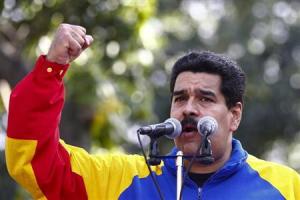Venezuela decrees new price controls to fight inflation
Venezuelan President Nicolas Maduro talks to supporters during a ceremony to commemorate the 56th anniversary …
By Brian Ellsworth
CARACAS (Reuters) - Venezuela on Friday decreed a new price control law that sets limits on company profits and establishes prison terms for those charged with hoarding or over-charging, part of socialist President Nicolas Maduro's efforts to tame inflation.
Maduro, who was elected last year to succeed the late Hugo Chavez, blames a 56.2 percent jump in consumer prices in 2013 on an "economic war" led by political adversaries, while critics call it evidence of the failure of Venezuela's state-driven economic model.
The Fair Price Law, which carries out many of the same functions as the almost identically-named Fair Price and Cost Law of 2011, appears to unify a disparate set of controls that were first created by Chavez in 2003.
It sets a maximum profit margin of 30 percent and requires firms to obtain "fair price certificates" to access dollars through the country's currency control mechanism.
The law carries prison sentences of up to 14 years for crimes including hoarding, "destabilizing the economy" and food trafficking, which refers to people buying subsidized goods and reselling them mainly in neighboring Colombia.
A price enforcement agency called the National Superintendence for Defense of Socioeconomic Rights will be charged with "determining reasonable profit margins."
Venezuela has for years passed regulations giving state officials sweeping power over the private sector, but selective enforcement tends to make the rules less draconian than they initially appear.
Previous laws created by Chavez called for prison sentences of up to six years for hoarding or overpricing of food.
Maduro last year launched a theatrical takeover of an electronics retailer accused of overpricing its products and led inspections of thousands of businesses, promising the effort would push consumer prices down by 5 percent in November.
Prices in fact rose 4.8 percent that month. But polls showed his popularity also rose in the wake of those measures.
Critics insist the OPEC nation's real problems lie in a torrid expansion of the money supply, inefficiency of state-run companies and a sluggish currency control system that prevents businesses from acquiring imported raw materials or machinery.
They also insist that expanding the cadre of state inspectors will only increase the possibilities for corruption.
Two high-ranking officials of the government's consumer protection agency, known for aggressive inspections of private companies, were arrested last year for extorting businessmen in exchange for not shutting down their shops.
Chavez enjoyed broad support from the poor during his 14-year rule thanks in part to subsidized state-run supermarkets that helped reduce hunger, winning Venezuela plaudits from the U.N. Food and Agriculture Organization.
Maduro's campaign against high prices has appealed even to some of his critics who agree unscrupulous shop owners have taken unfair advantage of consumers amid the inflationary spiral.
(Editing by Andrew Cawthorne and Paul Simao)


No comments:
Post a Comment